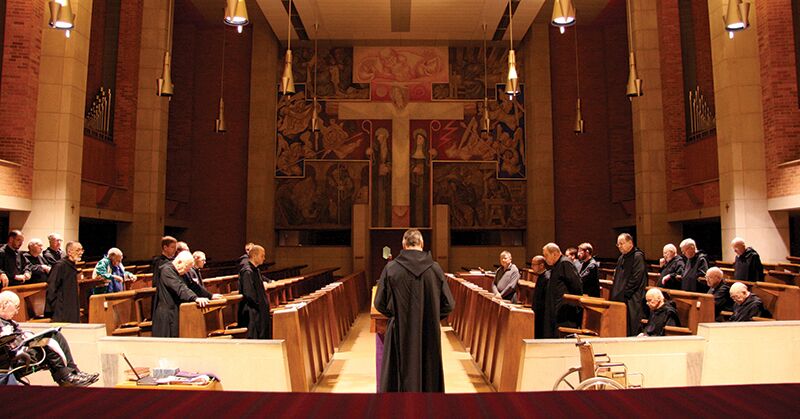 by Joe Bollig
by Joe Bollig
joe.bollig@theleaven.org
KANSAS CITY, Kan. — “Where there are religious, there is joy,” once said a wise man in Rome.
He also said, “A gloomy disciple is a disciple of gloom.”
That sage observer of consecrated life is none other than Pope Francis himself, who is not only the Successor of Peter, but has lived the consecrated life for many years as a Jesuit.
Pope Francis has called the church to celebrate the gifts of those in religious orders by proclaiming the Year of Consecrated Life, from Nov. 30, the First Sunday of Advent, to Feb. 2, 2016, the feast of the Presentation of the Lord.
“The Year for Consecrated Life concerns not only consecrated persons, but the entire church,” wrote Pope Francis in his proclamation message on Nov. 29.
“Consequently,” he continued, “I ask the whole Christian people to be increasingly aware of the gift which is the presence of our many consecrated men and women, heirs of the great saints who have written the history of Christianity.”
So, in the spirit of the Year of Consecrated Life, here are some thoughts from a few religious communities in the Archdiocese of Kansas City in Kansas.
Don’t be a pepper!
Pope Francis’ long life in a religious community is clearly reflected in things he’s said and done as pontiff.
“Two summers ago, he met with young religious in formation as well as seminarians from all over the world in Rome,” said community president Sister Susan Pieper of the Apostles of the Interior Life.
The pope talked, mostly off the cuff, for about an hour and shared what he learned from his experience of religious life.
“One funny thing he said was that we religious, as we get older, should not become like ‘pepperoncino sotto aceto,’ which literally means ‘a hot pepper soaked in vinegar,’” said Sister Susan.
“I think he was trying to say that, as we mature in years, sometimes we can become bitter, irritable and sad — not nice to be around,” she continued. “He was warning those people in formation to be attentive and not go down that path.”
He also warned them of a common temptation — which he himself fell into — of speaking badly of superiors and gossiping.
Living in community has influenced the kind of pope he is, said community director Sister Maureen Hall, of the Sisters of Charity of Leavenworth.
“I believe Pope Francis, being a member of the Jesuits, does have an insight into the common life, the various charisms and coming together to do what you can’t do alone to further God’s reign,” said Sister Maureen.
“His many pronouncements reflect, without ambiguity, [that] the people are the church of God,” she said. “Sharing life in community reminds us of this truth daily. We are invited to shape the ‘rough edges’ of our lives over and over again. His many statements and actions are prophetic, and religious life calls all of us to that role.”
‘Edgy’ folks live
on the edge
The pope has called the church to go out to the people living on the edge of society and the church — to the “peripheries,” as he puts it. But many archdiocesan communities are already there.
“We as Servants of Mary, in our own mission of caring for the sick in their own homes, caring for the dying and those who have no one to care for them, believe we are reaching to those in the peripheries,” said superior Sister Alicia Hermosillo, of the Sisters, Servants of Mary.
“Our ministry is not only focused on the spiritual and physical needs of the sick, but also their families,” she continued. “Since ours is a salvific mission to cooperate with Jesus and Mary for the salvation of all, . . . we strive to be faithful to our mission with the sick, trying to reach as many as we can — not only with our service, but also with our prayers and sacrifices.”
And being “edgy” — identifying with and serving those on the peripheries — is in the very DNA of the Capuchin Franciscans.
“In recent years, this means we have challenged our men in formation as well as many who are in full-time ministry to learn Spanish so that we can better serve a growing segment of our Catholic population,” said Father Duane Reinert, a Capuchin Franciscan.
“We have traditionally had a particular concern for the poor and have chosen to locate many of our houses in neighborhoods where we rub shoulders with those we serve,” said Father Duane. “In Colorado Springs, [Colorado], we responded to the bishop’s invitation to staff a Catholic chapel in the Citadel Mall [to] bring Christ to the marketplace. It has been a great place to evangelize [and] offer a thriving confession ministry!”
Inspiration to go to those on the peripheries comes from Jesus, according to provincial superior Little Sister Bénédicte, of the Community of the Lamb.
“The call of Pope Francis to go out to the peripheries resounds deeply in our hearts,” said Little Sister Bénédicte. “It comes together with the Holy Father’s insistence to look to Jesus in the Gospels.”
“He is indeed the One who condescended to become incarnate and dwell among us,” she continued. “He shares meals with the tax collectors and sinners, he mingles with the sick, the blind, the despised, the outcast — even the untouchable lepers. . . . Going out to the peripheries is no ‘social work,’ but rather a ‘contemplative mission,’ walking with Jesus, striving to follow in his footsteps.”
The “peripheries” include the urban core of Kansas City, Kansas, for the Benedictine Sisters of Mount St. Scholastica in Atchison.
“Our Keeler Women’s Center serves women in the heart of Kansas City, Kansas, with education, advocacy, and personal and spiritual development programs,” explained Benedictine prioress Sister Anne Shepard. “We provide counseling; classes on nutrition, parenting and English; spiritual direction; a drama group; and support groups” to a disadvantaged population.
“In addition,” she continued, “we have Sisters working at schools in the inner city, including Cristo Rey High School in Kansas City, Missouri., and Donnelly College in Kansas City, Kansas.”
Hey, do you smell sheep?
Jesus called for his followers to be “salt and light” to the world. But what does it mean to live this in the context of consecrated life today?
“No matter what time or culture we live in, our call to be ‘salt and light’ in the world as consecrated religious demands of us that we live our vocations well,” said Abbot James Albers, of St. Benedict’s Abbey in Atchison.
“If we answer that call to live our vocations as monks well,” he continued, “then that great commission to spread the Gospel should naturally flow from our communal lives and the works that we offer.”
First, Benedictines must be faithful to their primary work of prayer and, second, offer themselves for the benefit of the faith and well-being of God’s people.
“For us, that means mainly through education and pastoral works,” said Abbot James.
Although they live in community, consecrated persons must “have the smell of the sheep,” as Pope Francis declared. They must know and understand people to serve them.
“[Since] we go out to where people are, we need to have a pretty good grasp of what is happening in the world,” said Sister Susan.
“We need to keep up with what is happening — not only worldwide, but here in the United States and, in particular, those places where we minister,” she added. “We can’t lose touch with reality, otherwise we can’t meet people where they are at, and they will feel like they are not understood.”
The way consecrated persons can reach people today can be summed up in a single word: authenticity.
“This is a very good time to live as a religious in our culture,” said Sister Alicia. “Our society is tired of words. [People] want to see good examples and authenticity. As Saint Francis said, let us go out to evangelize and, if necessary, we will use words.”
“He meant that a religious person just living the life he is called to live in authenticity is enough to bring the kingdom of God to others,” she continued. “Words may be necessary, but they are not essential. If we as religious live with passion or consecration to God and our service to the people of God, we are going to be the ‘salt of the earth and light of the world’ without being aware of it.”
Not buying the
‘culture club’
There have always been challenges faced by those living the consecrated life, some worse than others.
This age is no different.
“There are many challenges today, as there have been in every age,” said Father Duane. “As Capuchin Franciscans, we give witness as simple brothers that we are all brothers and sisters in Christ. We give witness by life in community that living together in peace in our world is possible — not easy, but possible.”
“We give witness by our prayer, our simplicity of life, and our trust in God that our treasure is not in this world,” he added. “Like those we serve, we are broken, fragile and sinful. [God] can give us the courage and fortitude to continue our journey back to him, our creator.”
In reality, the struggles of religious are the same for all Christians: to be converted.
“As they struggle like everybody along the bumpy road of daily conversion, the religious can become ‘salt and light’ in the world when, discovering their weaknesses, they humbly embrace them and offer them up to the Savior,” said Little Sister Bénédicte.
Vowed religious do not live in a bubble. They face the challenges presented by the culture and their own human limitations.
So how do Benedictines face modern challenges? By seeking a balance.
“Culture does place challenges on us as monks,” said Abbot James, “[like] the various technologies and the question of balancing the good of these advances with the intrusion they might create on the simplicity of our lives to which we are called.
“But I think a particular challenge we face is recognizing the great need of the people of God for us to be a part of their lives alongside the tension of the very real human constraints of time and energy.”
In reality, the opportunities for ministry are unlimited, but there are just so many monks to go around.
“Our response to this very real need of God’s people, up against this very good tension of our human limitations, is to seek in our lives the balance to which Saint Benedict calls us,” said Abbot James. “If we don’t have this balance in our lives, then we won’t be very useful to God and his church very long.”
The year ahead
Plans are underway in many of the communities to celebrate the Year of Consecrated Life in a variety of ways.
The Benedictine Sisters of Mount St. Scholastica, for example, will begin the celebration of the Year of Consecrated Life on the feast day of St. Scholastica, Feb. 10, when students from Maur Hill-Mount Academy and St. Benedict School, both in Atchison, will join them for a Mass in St. Scholastica Chapel.
The Sisters are also hoping for visits from bishops with connections to the community from over the years. Bishop Edward Weisenburger, of the Diocese of Salina, worked with Benedictine Sisters in Piedmont, Oklahoma, and Archbishop Blase J. Cupich, archbishop of the Archdiocese of Chicago, was taught by the Benedictine Sisters of Atchison.
And, of course, the Benedictine Sisters, like all the orders, are hoping for a visit from Archbishop Joseph F. Naumann sometime during the year.
Watch upcoming issues of The Leaven and the websites and Facebook pages of the individual orders for detailed schedules of events.






